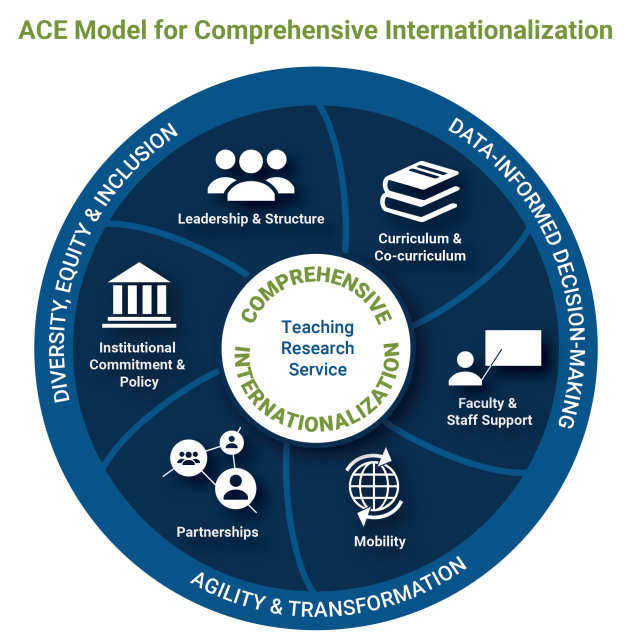Background
Professional and Global Education (PaGE) at California State
University, Stanislaus (Stan State) is committed to principles of
comprehensive internationalization as outlined by the American
Council on Education.

Current initiatives supported by PaGE emphasize virtual and
physical mobility (COIL; faculty-led programs in Ghana, Ecuador,
and Brazil; study abroad, Study At, Language and Culture
programs, international admissions); respond to transitions in
leadership and organizational structure (new leadership, relaunch
of International Education Advisory Committee); involve review of
international partnerships; and include implementation of new
technological structures and systems to support student
experiences across outreach, recruitment, application, and
admissions cycles.
PaGE priorities include completing a self-study and participating
in the ACE Internationalization Laboratory in AY 22/23. Related
activities will engage campus and community in strategic planning
efforts focused on international education and align objectives
and strategies with the University Strategic Plan and Diversity
and Inclusion Action Plan. They will assist in developing an
institutional signature and niche connected to Stan State’s
mission and commitment to impactfully serving diverse students
and communities. Stan State is designated a Minority Serving and
Hispanic Serving Intuition; 57% of students identify as
Hispanic/Latinx, 60% as traditionally underrepresented
minorities, 73% as first generation, 64% as Pell eligible. The
work of PaGE, comprehensive internationalization strategies, and
priorities for action will be situated in and relevant to the
institution and the region. That is, there will be connection
between global and local.
Request
PaGE requests Faculty Learning Committee support to lead and
facilitate broad-based discussion including students, faculty,
and administration focused on global competencies. Goals of
related activities include identifying elements or markers of
global competencies and recommending aligned assessment measures.
This work is critical to student experiences as well as program
assessment, enhancement, and improvement in global learning
contexts. Recommendations will be reviewed by the Dean and
Director of Study Abroad for administration in semester and
year-long study abroad contexts. They will also be reviewed by
faculty implementing COIL projects.
Work related to the tasks below will include ongoing engagement
with faculty governance and collaborative work with designated
PAGE staff.
- Define global competencies including related markers or
outcomes (fall 2022/spring 2023)
- Identify and recommend assessment measures that demonstrate
the extent to which students meet competencies; consider contexts
specifically including
- COIL/virtual mobility, and
- study abroad/physical mobility (spring 2023)
- Interface with other campus groups or learning communities
involved in related work (e.g. General Education, Diversity and
Inclusion action plans) to explore potential connections if of
institutional interest (spring 2023; ongoing TBD)
- Encourage integration of Global Learning into the curriculum
through outreach and professional development activities
designed, developed, and facilitated by the FLC (spring 2023;
ongoing TBD)
FLC Membership, Compensation, and Support
The FLC will be comprised of a minimum of five faculty members,
with at least one faculty member from each College, plus a
Facilitator. Faculty representation from the Graduate Council and
General Education Committee is also highly desirable. The
Facilitator will be responsible for ensuring progress of the FLC,
acting as Chair, and meeting regularly with the PaGE Dean and
staff leading and supporting international activities.
The Facilitator will receive a $2500 professional development
stipend per academic year (approximately equivalent to five work
days); the members will receive a $1000 professional development
stipend per academic year (approximately equivalent to three work
days. The FLC will be supported by Professional and Global
Education.
Call and Selection Process
This call, including Facilitator and Member positions, is open to
Stan State faculty. Preferred qualifications include: 1)
experience with global learning and/or familiarity with
global/international/intercultural competencies, 2) familiarity
with assessment practices and campus processes and policies, and,
for the facilitator 3) experience leading groups.
Applicants should submit a letter of interest that speaks to the
preferred qualifications to Jacob Copple (scopple@csustan.edu) by
September 30, 2022. The International Education Advisory
Committee (IEAC) will review applications and recommend
candidates. Appointments will be made by the Dean of Extension
and International Education in consultation with the IEAC.
Applicants will be notified by October 14, 2022 with FLC
activities starting thereafter.
Term of Appointments
The initial term of appointment for all positions is one academic
year, with potential for annual reappointment for up to three
years in total. Activities may include summer and winter work as
the FLC deems appropriate.
Additional Notes
Stan State’s baccalaureate learning goals reference demonstrated
respect and appreciation for diverse local and global peoples,
cultures, environments, and resources (5). General Education
learning goals include development of abilities to integrate
knowledge, make informed ethical decisions, and accept civic
responsibility; demonstrated by identification and analysis of
problems within local, regional, national, and/or global contexts
(3.3) and enhanced awareness of multicultural, community, and/or
technological perspectives (3.4). Graduate learning goals broadly
reference demonstrated relevant knowledge of diverse perspectives
and broader contexts as appropriate to the discipline. University
Strategic Plan goals, objectives, and strategies provide
additional context for developing an operational definition of
global competencies and recommending aligned assessment measures
such that outcomes associated with curricular and co-curricular
experiences, including those specifically connected to mobility
programs, may be examined. University Strategic Plan (2017-2025)
objectives and strategies include the following:
Goal 1 – Objective B – Strategy 7
Enhance or establish institutional structures and/or activities
that support building intra-personal connections and resources –
Create and support study abroad opportunities for more students.
Goal 2 – Objective B – Strategies 1, 2
Ensure every student participates in at least three High Impact
Practices (HIPs) before graduation (three for undergraduates, one
for graduate students) – Increase student participation in study
abroad and away opportunities, create and implement a system for
measuring participation and assessing impact.
